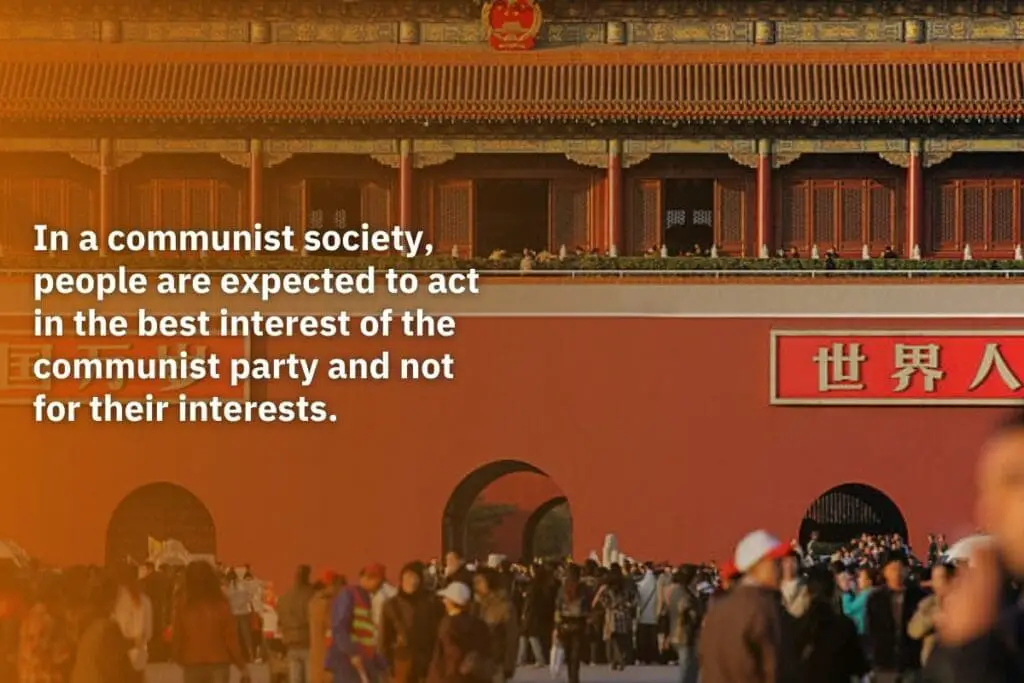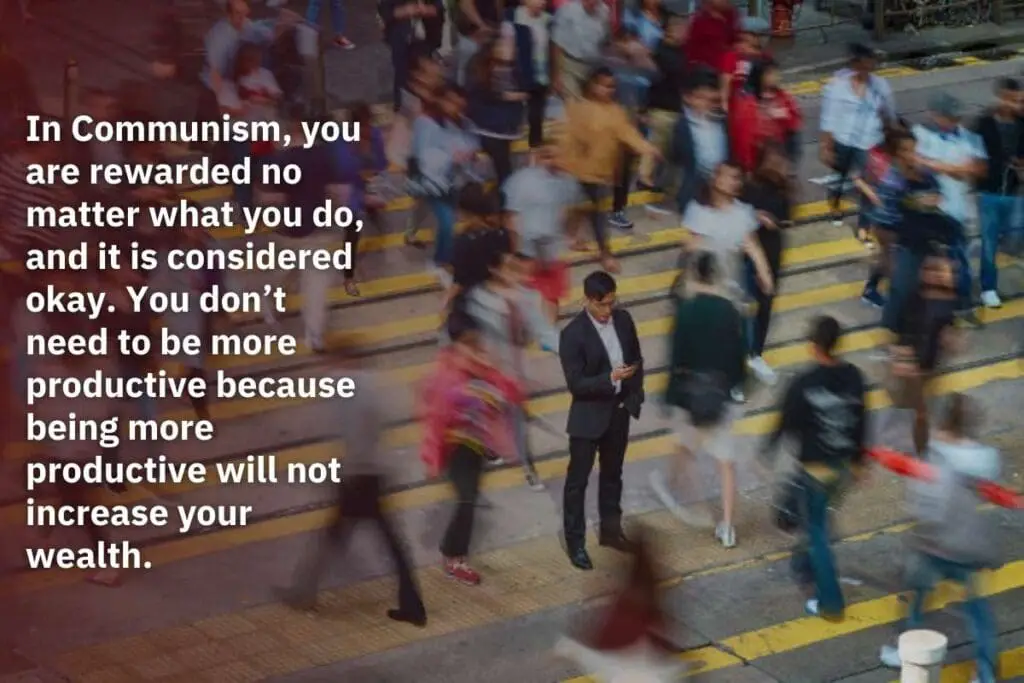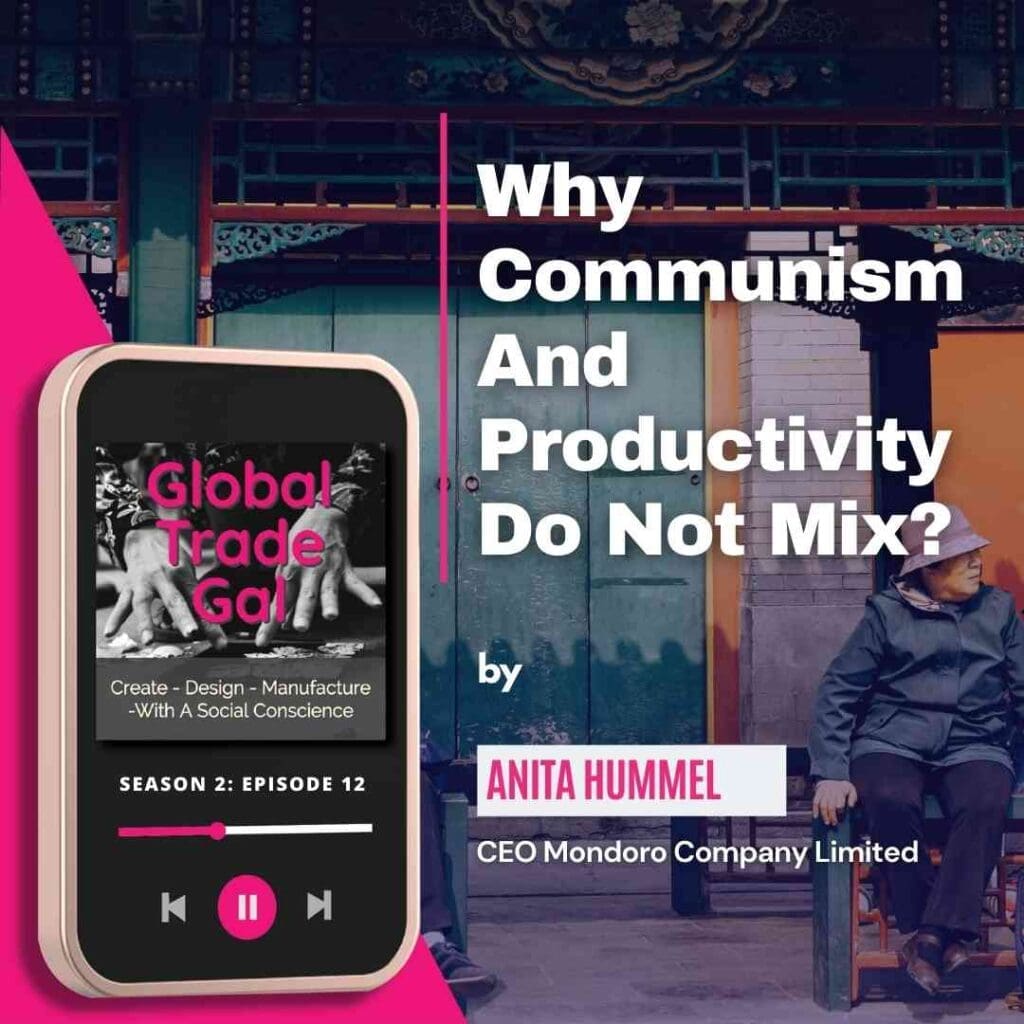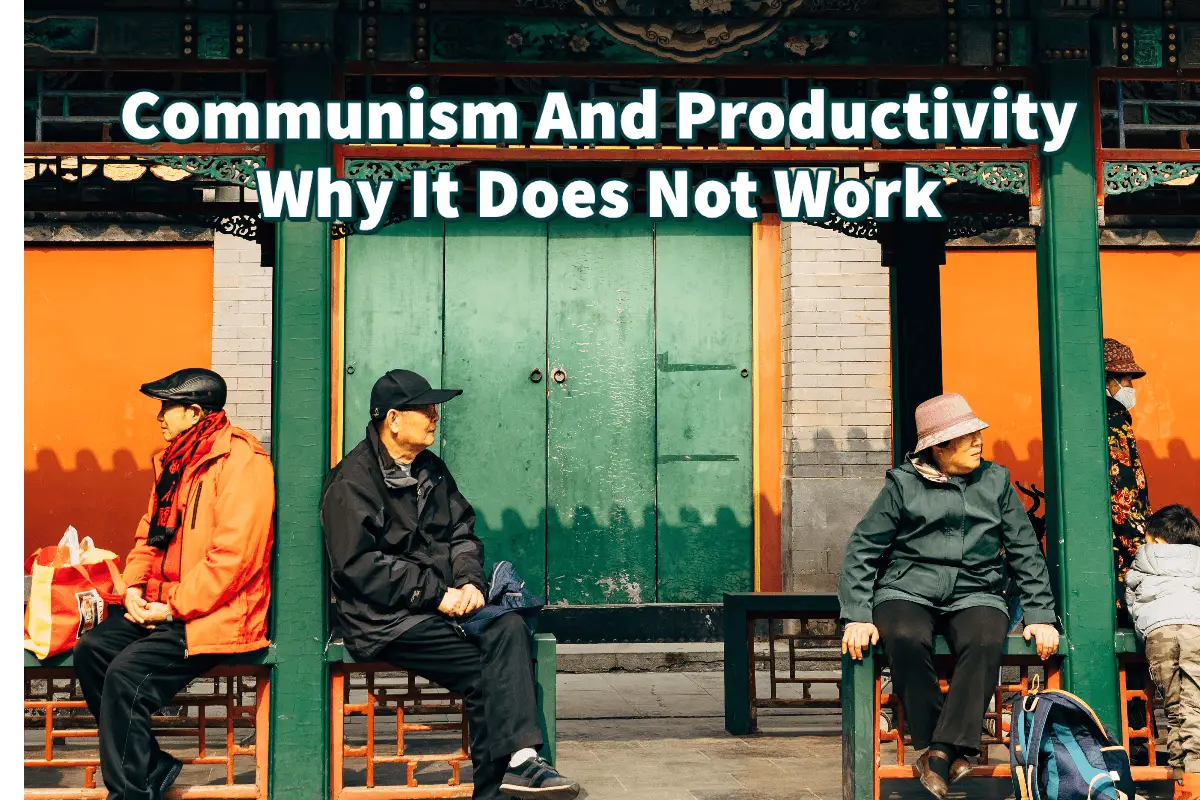I have spent a good part of my adult life living and working in socialist or communist countries. One of the things that I have always seen is how strict communist principles and productivity do not mix well together.
Communism is the common ownership of production; each person in communist society will get the same reward whether they work hard. The concept of Communism goes against the principles that make productivity work. People work harder when there is some incentive to want to work harder.
Table of Contents
- Communism And Productivity
- Productivity and Incentive
- Overmanning Of Positions Decreases Productivity
- Frequently Asked Questions
- Related Content
Communism And Productivity
Communism is characterized by shared ownership of the means of production. In theory, people in a communist system are supposed to have free access to all the fundamental articles of consumption. In other words, Communism is about having a classless, stateless, and almost moneyless society where everyone has equally the same amount.
In the communism theory, everyone is equal, which means that society will look upon the distribution of goods based on needs and not what you earned or did not earn.
In a communist society, if you cannot work because you are sick, the communist system or society should take care of you, and you will not need to work. Those who can work and are not ill, are required to work. In Communism, those who can work and those who cannot work should have about the same standard of living.

In a communist society, people are expected to act in the best interest of the communist party and not for their interests. Chairman Mao Tse Tung said it this way about the ideal Communist Worker.
“At no time and in no circumstances should a Communist place his personal interests first; he should subordinate to the interests of the nation and the masses. Hence selfishness, slacking, corruption, seeking the limelight are most contemptible, while … working with all one’s energy, whole hearted devotion to public duty, and quiet hard work will command respect.”
Mao Tse Tung
According to this ideal from Chairman Mao, a communist person was expected to work hard and not care at all about what they were being paid. Communism is not about you wanting to earn income or have your reward but working to help the communist ideal.
Productivity and Incentive
The issue with the ideal Communist worker is that we are all human beings, and as human beings, we naturally want to be rewarded for hard work. As human beings, we do not want to be paying for our neighbor who is not working and maybe could be working. We wish to receive acknowledgment when we have done an excellent job.

All of those things help to incentivize us and help to drive us to become more productive. Historically, it has been found that Communism does not foster good work ethics, and Communism does not foster work productivity.
Michael Lindsay, UK China scholar, said this about productivity and Communism:
“The actual Communist choice is almost certainly that “Socialism” defined in Communist terms, is a more important objective that productivity or raising the standard of living.”
Michael Lindsay
As Michael Lindsay has pointed out, the problem with the communist system is that the system itself is more important than productivity or using productivity to raise the standard of living.

In Communism, you are rewarded no matter what you do, and it is considered okay. You don’t need to be more productive because being more productive will not increase your wealth. Under the Communist system, most people do what they need to do to get by and not much else.
I experienced this firsthand when I went to school in China in the mid-1980s. At the time, China was heavily communist; there was a minimal incentive for any workers to do anything extra.
We would go into a store, and if we happened to go in during their lunch break, which could last anywhere from 2 to 3 hours, the girl behind the counter would be sleeping. No matter what, we could not get her to wake up and give us any service; we had to wait until her break was up, and then she would gladly help us with what we needed. There was no incentive for her to do anything extra other than what she had been asked to do.
I remember the same thing for buses and taxis. Sometimes a bus driver would even let us on the bus but would not move until it was precisely his time to move; sometimes, this could be a couple of hours if we got the bus during his lunch break.
Entire cities and the country seem to close down for hours at a time because this was considered their lunch break. No one wanted to do anything extra during that time as there was no incentive to do so.

Listen To Our Podcast Why Communism And Productivity Do Not Mix? below or by clicking here.
Overmanning Of Positions Decreases Productivity
One of the things that happened in Communist societies was the belief that all communists, or in other words, everyone, needed to be employed. Communism ideals tend to lead to overmanning positions in an office, factory, or even a store.
You could walk into a government office and find that half the people are sitting around without any work to do and are openly reading the newspaper. They really do not have any work to do and are given a job to say they have work.
Speaking of this, David Lane, another scholar, said this:
“This fact, gives rise to economic pressures that keep wage low and demand for labour high, which leads to widespread overstaffing and slack work standards.”
David Lane
The overmanning of positions or people having work just for the sake of work are things that you may still find today in some socialist and communist countries, especially in government offices. People have a position and work to do, but no one is very busy or working very hard.
Overstaffing can hurt productivity throughout the organization. Half the people are being paid and not working, and the other half is working hard, which hurts morale and productivity. The people who are working hard begin to wonder why they should work hard when it does not matter, and they will be paid the same as someone who is not working.
In turn, this leads to laziness and corruption throughout the entire organization. People want to get ahead, so instead of looking at what they can do to work harder and earn more money, they start to look at how corruption can bring them what they see as easy money.
My own experience has taught me that Communism does not lead to productivity as there is no incentive for anyone to work hard. People like to have an incentive and know if they work hard, there will be some award or acknowledgment.
Communism took all this away from individuals as people were supposed to work just for the communist ideals. Communism leads to a lack of productivity, overstaffing, and a lower standard of living, along with an incentive to use corruption to get ahead.
Countries like China have gone away from the rigorous communist model. Today you can see that the standard of living in China has increased tenfold since the 1980s. In China today, incentives, productivity, and motivation are there for people to work hard and find ways to improve their lives and livelihood.
Communism and productivity do not mix well together. Communism has the opposite effect of incentivization and productivity.
Find out more about how Mondoro can help you create, develop, and manufacture excellent home decor and home furniture products – don’t hesitate to contact me, Anita. Check out my email by clicking here or become a part of our community and join our newsletter by clicking here.
Mondoro gives out a FREE Lookbook to anyone interested. You can receive a copy of our latest Lookbook by clicking here.
Listen to our Podcast called Global Trade Gal. You can find it on all major podcast platforms. Try out to listen to one of our podcasts by clicking here.
Subscribe to our Mondoro Company Limited YouTube Channel filled with great videos and information by clicking here.
Frequently Asked Questions
What is communism?
Communism is a socio-economic ideology that advocates for the common ownership of the means of production and the absence of social classes, where goods and resources are distributed according to individuals’ needs.
How does communism distribute rewards for work?
In communism, the idea is that each person receives an equal share of resources and benefits, regardless of the amount or quality of work they contribute.
Does communism discourage hard work?
Critics argue that communism can discourage hard work because there is no direct incentive or reward for individual effort beyond meeting basic needs.
What incentives do people have to work harder in a communist society?
Proponents of communism argue that the incentive to work in a communist society comes from the motivation to contribute to the collective welfare and the satisfaction of fulfilling one’s societal duties.
How does communism address the issue of productivity?
Communism seeks to address productivity by emphasizing cooperation, shared responsibility, and collective decision-making rather than individual competition and profit-driven motives.
Are there any historical examples of communist societies?
There have been several attempts to establish communist societies, including the Soviet Union, China, Cuba, and various other countries that implemented socialist or communist systems.
Does communism promote equality?
Yes, one of the central principles of communism is the aim to achieve social and economic equality by eliminating social classes and distributing resources based on need.
Are there any drawbacks to the communist approach?
Critics argue that the lack of individual incentives in communism can lead to a lack of innovation, motivation, and productivity. They also point to historical examples where communist regimes faced economic challenges and restricted personal freedoms.
Related Content
Don’t Confuse Activity With Productivity & Other Myths
Being busy or having a lot of activities and things to do is not the same thing as productivity. Productivity is when you do those activities and things that help you focus on the company’s growth. Busyness or being busy is not the same thing as being productive.
You can discover more by reading Don’t Confuse Activity With Productivity & Other Myths by clicking here.
What Is Meant By Production & Productivity, Their Difference Explained
Production is about manufacturing goods from the raw material form to a finished product. Productivity is considered part of the production process. Productivity is about how efficient a country or company is. Productivity is an economic principle; a formula is used to calculate productivity.
You can discover more by reading What Is Meant By Production & Productivity, Their Difference Explained by clicking here.
8 Reasons Productivity Makes You Happy
There are many ways that productivity can help to make you happy. Studies have shown that some of the most productive people are also the most content. Productive people accomplish things, learn new things, achieve goals, and do the other things in life that help ensure they are effective and happy. The good news is that productivity can help to make you happy.
By clicking here, you can discover more by reading 8 Reasons Productivity Makes You Happy.


